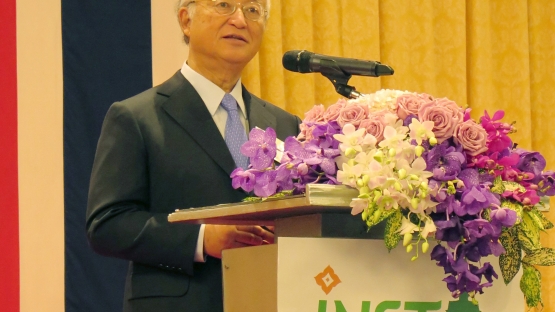IAEA Director General Yukiya Amano stressed the importance of training medical and technical specialists from developing countries in nuclear medicine and cancer control in a keynote address at the International Nuclear Science and Technology Conference in Bangkok on August 4.
Noting that human health was an increasingly important area of the IAEA’s work, he said: “We assist developing countries in the safe and effective deployment of radiation medicine, and related nuclear techniques, to address conditions such as cancer, cardiovascular diseases, tuberculosis and malnutrition.”
There are four main areas to the IAEA’s work on human health: nuclear medicine, which involves procedures such as PET/CT scans that use radioactive sources to help doctors see what is happening within a patient’s body and decide on appropriate action; radiotherapy; dosimetry, which involves ensuring that cancer patients receive the correct radiation doses; and nutrition.
In the nutrition field, the Agency helps countries to use stable isotope techniques to assess body composition and bone mineral density. This can help to determine whether infants are getting the nutrition they need, providing more detailed information than the traditional method of weighing babies before and after each feed.
The IAEA has had a special focus on cancer in developing countries for many years.
“Unfortunately, many developing countries lack both equipment and the trained medical and technical experts to treat cancer effectively,” said Mr Amano.
It is estimated that some 60 percent of all new cancer cases in the coming decades will be recorded in developing countries, where around 70 percent of cancer-related deaths will occur.
“This is a great human tragedy,” he said.
The IAEA has developed innovative approaches to training. It supports e-learning platforms known as the Human Health Campus and the Virtual University for Cancer Control which offer high-quality online training free of charge.
This means that doctors and medical physicists, for example, can receive expert training without leaving home for costly trips abroad which their countries can ill afford.
“We have achieved a lot in the cancer field over the years and many lives have been saved,” Mr Amano said. “But the need is enormous and much more needs to be done. The IAEA will continue to make its specialist nuclear expertise available to help save lives. This is a high priority for the Agency and for me personally.”
The Director General noted that the IAEA was able to respond quickly to health emergencies in Member States. It provided rapid technical assistance as well as diagnostic kits and laboratory supplies to help West African countries respond to the Ebola virus several years ago and was now providing similar assistance to countries in Latin America and the Caribbean affected by the Zika virus.
Nuclear techniques support development
During his visit, Mr Amano visited the Fruit-fly Mass-Rearing and SIT X-ray Facility at Thailand’s Institute of Nuclear Technology, as well as the Isotope Hydrology Laboratory.
The IAEA is assisting Thailand in assessing deep groundwater resources for sustainable management through isotopic techniques as part of its technical cooperation programme. It is also supporting the use of sterile insect techniques to suppress insects that create havoc to agricultural produce. These techniques can also control mosquitoes that transmit viruses such as dengue.
At the Pathumthani Rice Research Center, Mr Amano received a detailed briefing on the progress made in improving the quality of new varieties of rice developed using nuclear techniques. Some 150 varieties of rice which are better able to withstand flooding are undergoing advanced field trials.
During his two-day visit to Thailand, Mr Amano met Prime Minister Prayut Chan-o-cha, Minister of Foreign Affairs Don Pramudwinai and Minister of Science and Technology Pichet Durongkaveroj.
Mr Amano this week is in Australia and New Zealand, following which he travels to Singapore.








